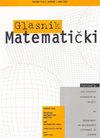多项式的皮莱猜想
IF 0.5
4区 数学
Q3 MATHEMATICS
引用次数: 0
摘要
本文研究了指数丢番图方程-17ex p^n - q^m = f上Pillai猜想的多项式版本。我们证明了对于任意非常多项式\( f \),只有有限多个四元组\( (n,m,\deg p,\deg q) \)由整数\( n,m \geq 2 \)和非常多项式\( p,q \)组成,使得Pillai方程成立。此外,我们将给出一些例子,说明多项式仍然有无限多种可能性\( p,q \)。本文章由计算机程序翻译,如有差异,请以英文原文为准。
Pillai's conjecture for polynomials
In this paper we study the polynomial version of Pillai's conjecture on the exponential Diophantine equation
-17ex p^n - q^m = f.
We prove that for any non-constant polynomial \( f \) there are only finitely many quadruples \( (n,m,\deg p,\deg q) \) consisting of integers \( n,m \geq 2 \) and non-constant polynomials \( p,q \) such that Pillai's equation holds.
Moreover, we will give some examples that there can still be infinitely many possibilities for the polynomials \( p,q \).
求助全文
通过发布文献求助,成功后即可免费获取论文全文。
去求助
来源期刊

Glasnik Matematicki
MATHEMATICS, APPLIED-MATHEMATICS
CiteScore
0.80
自引率
0.00%
发文量
11
审稿时长
>12 weeks
期刊介绍:
Glasnik Matematicki publishes original research papers from all fields of pure and applied mathematics. The journal is published semiannually, in June and in December.
 求助内容:
求助内容: 应助结果提醒方式:
应助结果提醒方式:


